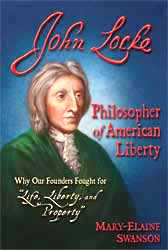
John Locke: Philosopher of American Liberty
John Locke: Philosopher of American Liberty
Book - $19.95
Magnus opus by the accomplished scholar, biographer, and author of The Education of James Madison: A Model for Today, co-author with Marshall Foster of The American Covenant: The Untold Story, presenting the much-needed truth about John Locke, the most read and quoted thinker of our Independence era. From original sources Mrs. Swanson documents Locke's true Biblical Christianity as the source of his ideas, demonstrating that our Founders understood “the pursuit of happiness” as the Bible’s protection of property, and that the Bible is the underlying foundation of civil law and liberty proclaimed in the phrase “the Law of Nature and Nature’s God.”
The book is divided into Five Parts and is fully footnoted and indexed:
- Foreword by David Barton quotes American Presidents throughout our history, from John Adams through George W. Bush, who have acknowledged Locke's incalculable contribution to America.
- Part One includes a biography of John Locke, showing his Biblical and Christian belief and character, along with the historical background of his life and times.
- Part Two documents Locke's philosophical and active influence on securing religious toleration and the rights of Englishmen up to the time of William and Mary.
- Part Three examines the influence Locke's governmental reasoning had on our Founding Fathers and the establishment of American liberty.
- Part Four examines Locke's philosophy in contrast to the French philosophes who dropped his God-given basis and embraced an anti-religious, secular and absolutist political theory. She presents a clear comparison (illustrated in the life of Lafayette who was inspired by Lockean thinking to fight for freedom on two continents), of the French Revolution which gave rise to anarchy and chaos, against the American War for Independence which resulted in a stable and just government with individual liberty and prosperity.
- Part Five shows the application of Locke's governmental philosophy to America's situation today. The author concludes that the United States is now following, at its peril, many of the absolutist political ideas of Rousseau rather than the truly liberating ones of John Locke, so important to a free people. Americans are not being taught the treasures entrusted to them in their heritage and particularly in the Declaration of Independence and the Constitution. It is no wonder that they fall easy prey to specious arguments in favor of socialistic policies. John Locke's First Treatise of Government demolished the idea of absolute monarchy (or arbitrary rule by men, not law), and the Second Treatise provided a blueprint for a system of government with a written constitution that would ensure the citizen's "life, liberty, and property."
- Appendix includes three documents of rights directly influenced by Lockean governmental philosophy: The Virginia Declaration of Rights (also a model for our Bill of Rights); The Declaration of Independence (which includes Locke's words almost verbatim and gives the philosophical foundation for our Constitution); Lafayette's French Declaration of the Rights of Man and the Citizen (rejected by the French Revolution leaders along with the Constitution Party, and Lafayette imprisoned), while France did not finally become a republic until 1875, and his Declaration of Rights finally became the Preamble of the Constitution of the French Republic.)





